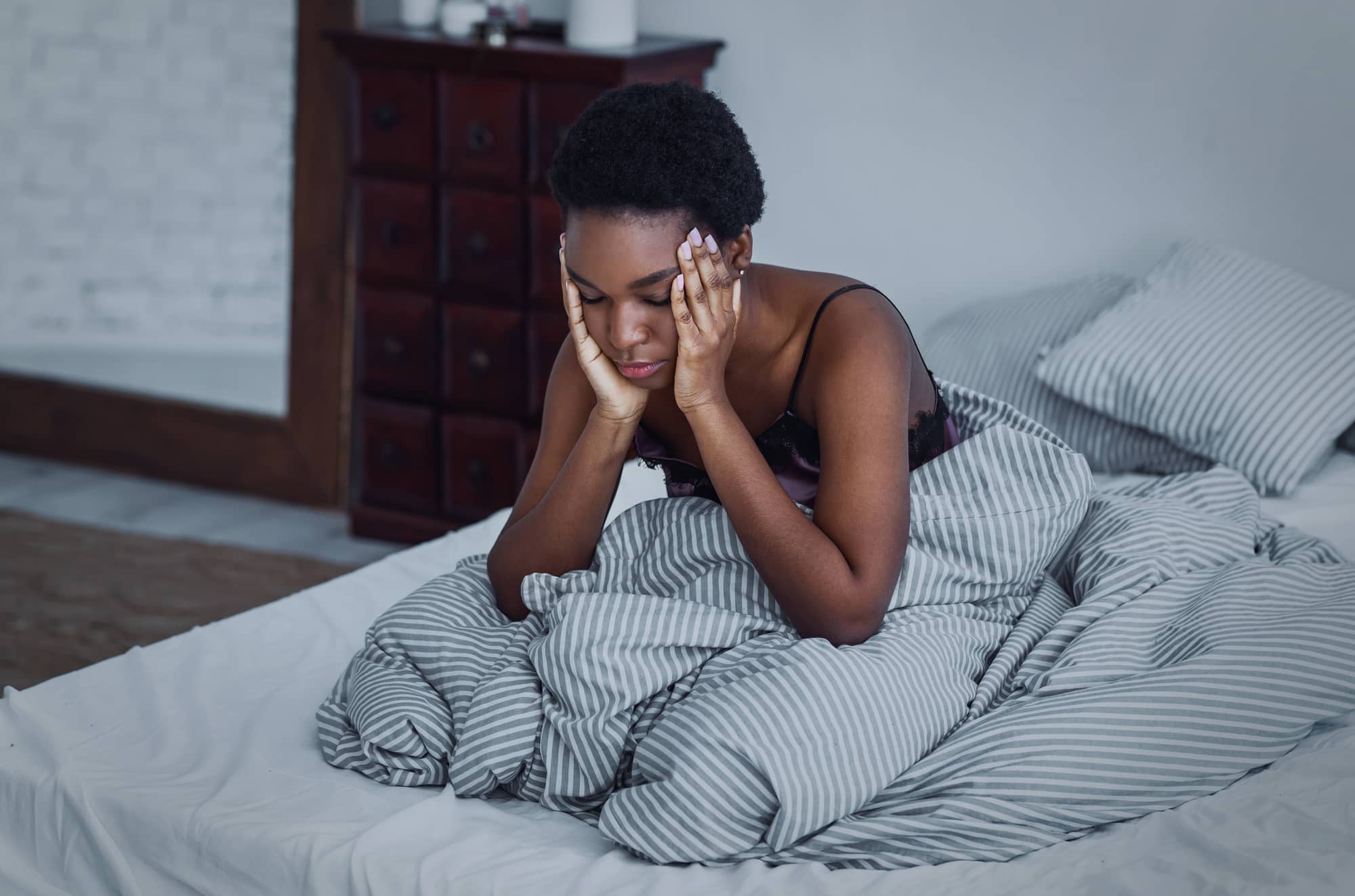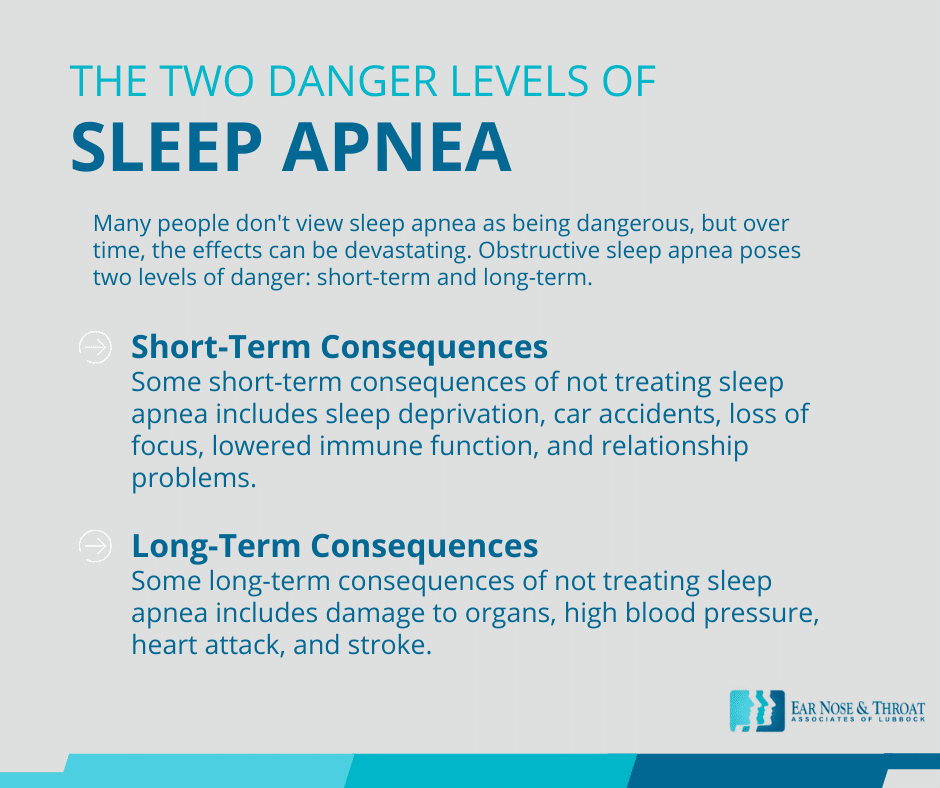Why It’s Dangerous To Leave Your Sleep Apnea Unchecked

Many people have heard of sleep apnea and associate it with annoying problems like snoring and tiredness. But what about other side effects of this condition? And, more importantly, is sleep apnea dangerous?
A Quick Explanation of Sleep Apnea
Obstructive sleep apnea is the most common type of sleep apnea. It happens when there’s a blockage somewhere in your airway while you’re trying to sleep.
Muscle tone is much lower when you’re asleep than when you’re awake. Even the muscles of your airway relax. This relaxation can cause the tongue and tonsils to fall back and block off your airway. For people with larger bodies, fatty tissue in the neck can also put pressure on the airway.
An obstructed airway keeps your lungs from getting the airflow they need to function properly. It can also cause your heart to work overtime as it attempts to make up for the lack of oxygen from your lungs.

Is Sleep Apnea Dangerous?
Many people don’t view sleep apnea as being dangerous, but over time, the effects can be devastating. Obstructive sleep apnea poses two levels of danger: short-term and long-term.
Short-Term Consequences of Sleep Apnea
The short-term consequences of sleep apnea occur immediately, rather than building up over time. “Short-term” doesn’t mean they go away, however. Unfortunately, these symptoms remain until you receive effective treatment for your sleep apnea.
Sleep Deprivation
Sleep apnea can leave you feeling exhausted. Even if you’re in bed for a full eight or nine hours, you may only get twenty minutes of true, restful sleep. Hitting the snooze button doesn’t make you feel any better, and your exhaustion follows you throughout the day.
You may notice you drink more and more coffee just to function normally, feel miserable during the workday, or nod off at inopportune times. This level of sleep deprivation isn’t the same as missing an hour of rest here or there.
Car Accidents
Any kind of sleepiness can affect your operating of heavy machinery, including your car. People experiencing sleep deprivation are six times more likely to be involved in a vehicle collision than their well-rested counterparts.
Loss of Focus
It’s much harder to focus on the task in front of you when you’re not well-rested. You may find yourself asking coworkers to repeat themselves multiple times or zoning out as you try to read an email. Tasks that normally take little effort suddenly become huge chores because you just can’t concentrate. Sleep deprivation that leads to poor concentration can seriously impact your performance at work.
Lowered Immune Function
Even your immune system is compromised when you don’t get enough sleep. You don’t heal as easily without enough rest, and you’re more susceptible to illnesses. It’s also harder to get healthy and stay healthy when you’re too tired to exercise or cook a healthy meal.
Relationship Problems
Lack of sleep impacts your relationships, and it can lead to depression, anxiety and other mental health problems. And since sleep apnea usually leads to loud snoring, it can also make your partner miserable!
Long-Term Consequences of Sleep Apnea
The short-term consequences of sleep apnea can compound to cause further problems, of course. For example, if your body doesn’t heal well, a common cold or flu can more easily turn into something else, like pneumonia. But sleep apnea also causes other, more serious long-term problems when left untreated.
Damage to Organs
Because sleep apnea keeps you from breathing properly while you sleep, your body is repeatedly oxygen-deprived throughout the night. A lack of oxygen to any part of the body is bad news, but this takes a particular toll on your heart and lungs.
High Blood Pressure
People with untreated sleep apnea are four times more likely to have high blood pressure, also called hypertension. Hypertension can eventually lead to heart failure as well as other complications.
Heart Attack
Severe sleep apnea sufferers are twice as likely to have a heart attack as others.
Stroke
Those with severe sleep apnea are 1.8 times more likely to have a stroke.
Where Do I Start if I Think I Might Have Sleep Apnea?
The first step in getting evaluated for sleep apnea is to visit your doctor and tell them your concerns. Your doctor will then order a sleep study.
A sleep study is the only way to diagnose sleep apnea. It can be done either in your home or at a sleep lab. Although the technology used in a sleep lab may be a little more accurate, you might sleep better in your own home. Which setting you choose is up to you and your doctor.
After your test, your doctor can talk to you about your results and give recommendations for your specific situation. Together, you’ll decide on what treatment is right for you.
Some recommendations your doctor might make include:
- weight loss
- oral appliance therapy
- a CPAP machine
- Inspire
It’s difficult to make decisions when you’re exhausted. But the decision about where to get treatment for your sleep apnea doesn’t have to be difficult.
ENT Associates of Lubbock offers a number of solutions for your obstructive sleep apnea. Regardless of the age of the patient or the severity of the sleep apnea, we can help. We treat the whole family, and we look forward to meeting with you!
Book a consultation today to discuss your sleep apnea with one of our experienced ENT doctors.
Dr. Cuthbertson is a physician at Ear Nose & Throat Associates of Lubbock. He joined the team at ENT Lubbock from Houston, where he was chief resident of the prestigious Bobby R. Alford Department of Otolaryngology at Baylor College of Medicine. He is board certified in Otolaryngology and Head & Neck Surgery and has quickly built a reputation, not only as an extremely skilled surgeon, but as an approachable and compassionate clinician adept in the newest standards and technologies. Learn more about Dr. Cuthbertson.
Categories:








